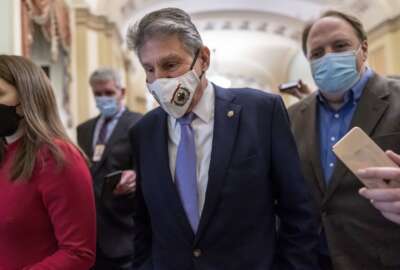Hubbard Radio Washington DC, LLC. All rights reserved. This website is not intended for users located within the European Economic Area.
Administration isn’t finished with its plans for the contractor workforce
The debt ceiling is looming closer and the government shutdown is only a couple of weeks away. And the mask mandate continues to roil Congress.
Best listening experience is on Chrome, Firefox or Safari. Subscribe to Federal Drive’s daily audio interviews on Apple Podcasts or PodcastOne.
The debt ceiling is looming closer and the government shutdown is only a couple of weeks away. And the mask mandate continues to roil Congress. For a look at the week ahead on the Hill, WTOP Capitol Hill correspondent Mitchell Miller joined the Federal Drive with Tom Temin.
Interview transcript:
Tom Temin: And before we get to the Hill, though, Mitchell, I wanted to ask you about the latest executive order, something we haven’t seen in a few years here. And that is regarding the work place protections for federal contractors, when a contract gets switched from one company to another.
Mitchell Miller: Right. This is generating a lot of discussion as you know. President Biden signing this executive order last week that limits turnover for federal service contract workers, offering them basically the right of first refusal when a contract changes hands. So under that order, a contract is transferred from one contractor to another. Employees from the previous contract, who did their jobs must also have to be offered the opportunity to keep their jobs working for the new contractor. And this has extensive implications, as you know, covering more than 2 million federal contractors throughout the industry. Now the White House says the order will reduce turnover among workers who fulfill their critical roles and do federal operations. But as you’re also aware, it’s getting pushed back because some contractors or agencies, they don’t like the contractor, and they’re trying to move on. Maybe there were problems, maybe they were issues with turnover, or with employees that didn’t show up, or they didn’t get things done on time? So this is generating a lot of discussion here.
Tom Temin: Yes, I can imagine what would happen: Let’s switch to the other contractor, because Larry, the engineer on this one is terrible. And next thing, you know, you switch contractors. And there’s Larry, again, working for the new company. Besides, one association had told me already that besides that issue, is the fact that the companies that trained and promoted and otherwise took care of these employees – why should they have to give them up to another company, when they could use the same workforce to go after other contracts?
Mitchell Miller: Exactly. Because a lot of these costs, as you know, are generated in that training process. And just getting them up to speed on these contractors can take a lot of money and a lot of time. So there’s some controversy related to this. The some of the contractors say yes, we know what the White House was trying to do here. This is another example of a “well intentioned idea” from the federal government. But there’s definitely a lot of concern about it.
Tom Temin: And it has that come up on the Hill, too, do they discuss it up there also?
Mitchell Miller: Well, they’re going to be discussing this because, as you mentioned, many of these lawmakers that represent areas that have contractors, and of course, we have a lot of them here in the Washington area are making their concerns known. So I have a feeling that the lawmakers are going to make some tweaks and try to see if they can alter this a little bit so that it is more favorable to allowing the contractors to do what they need to do efficiently.
Tom Temin: Alright. And today is the deadline for vaccinations to switch gears here for a minute. And the White House is holding the line on that. Again, what’s the reaction on the Hill?
Mitchell Miller: Well, there is basically a feeling here mainly among the lawmakers that everything needs to hold as the administration wants it on these vaccination requirements, at least more so on the Democratic side. There is some pushback among Republicans who don’t like these mandates, but they are saying that, and the White House reiterated last week that today’s deadline is going to stand. Now the American Federation of Government Employees representing 700,000 federal workers, as you know, has tried to get this to be pushed back. But the Biden administration basically held firm last week and said this date would not be changed. Now, going back to contractors, federal contractors, it has been pushed back. They have until Jan. 4, but there again, there have been some issues. They are not giving the contractors the option of giving weekly tests to employees. And also as this gets kicked around in the courts with OSHA and private contractors and private businesses, we’re going to see some issues percolating I think I’m that front. But at least for now, in terms of the overall federal employees, this deadline today is standing.
Tom Temin: Alright, well, I can see what the Thanksgiving dinner tables around the country are going to be like: You want the drumstick? Show me your vaccination card.
Mitchell Miller: Exactly.
Tom Temin: We’re speaking with Mitchell Miller, Capitol Hill correspondent for WTOP. And turning to purely at this point, congressional issues, we do have this debt limit deadline coming up and also the deadline for the budget as the continuing resolution starts to expire. What do you see a head going on this week?
Mitchell Miller: Well, this is a familiar picture. We’ve seen this movie before, right? Everything starts to pile up in November and then into December as we get closer to those deadlines. So first, on the debt limit. There is actually some encouraging news related to that. There was a lot of gloom and doom the last time this issue came about but Senate Majority Leader Chuck Schumer met with Senate Minority Leader Mitch McConnell last week and by all indications there is some comity in there – as opposed to the other comedy – in terms of what they might actually both be able to agree to, and it appears that the Democrats are now trying to set things up so that basically through reconciliation, they on their own, could actually raise the debt limit. And McConnell has given some indications that he wouldn’t throw any wrenches into the wheels on that. So we’ll see where that goes. Because as you know, the Treasury Secretary Janet Yellen has said, the nation could default on its debt as soon as Dec. 15. There could be some wiggle room on that, but at least some encouraging news on that front. And then related to the Dec. 3 latest deadline in connection with a possible government shutdown. No one really on the Hill feels that there’s going to be a shutdown, but the arguments are going back and forth about how long this short term continuing resolution is going to be. Some Democrats are now saying maybe they should just do it for a very short period of time, maybe even only two weeks. That argument is because they’re saying they don’t want to be locked into a longer CR that would basically freeze those limits that were set. under the Trump administration. I was speaking with Virginia Senator Mark Warner about this who’s very steeped in these budgetary and financial issues, he does not really like the idea of going to a short term, he’d like to see something longer term, in fact, very long term if they could ever agree to it. But we’ll see what happens there.
Tom Temin: And finally, the mask mandates continued to roil the Hill itself. And some representatives have gotten big fines for not using their masks. This as D.C. I think follows Montgomery County today. And going back to the indoor mask mandates.
Mitchell Miller: Yeah, this is really interesting, because in some respects, the U.S. Capitol is almost like on an island here because even though it is in effectively in D.C., although on federal property, these mask guidelines have changed in D.C., as you know, as of today, but in Congress, at least for now the House Speaker Nancy Pelosi has indicated that these mask mandates will stay in effect for now, when they were taking up the huge massive spending bill that the President has proposed everybody had masks on pretty much in the chamber. Now there have been some exceptions. And one of them notably is Georgia Congresswoman Marjorie Taylor Green who has made a very significant effort to protest these mask mandates. In fact, she’s already racked up more than $60,000 in fines. Right now, if she were to keep on that track, and they don’t change any of the restrictions. She could actually top more than $100,000 by the end of the year. So a really interesting situation there. There’s others that also have racked up some fines although she is definitely high on that one. I will say in connection with being in the Capitol when you walk around. Everybody still is wearing their masks for the most part here and there. You’ll see people that are not but at least for the moment. These masks are staying on and there is a mask mandate here at the U.S. Capitol.
Tom Temin: Maybe they should call that the Island of Dr. Moreau? Mitchell Miller is Capitol Hill correspondent for WTOP, thanks so much and have a great Thanksgiving.
Mitchell Miller: You too.
Copyright © 2024 Federal News Network. All rights reserved. This website is not intended for users located within the European Economic Area.
Tom Temin
Tom Temin is host of the Federal Drive and has been providing insight on federal technology and management issues for more than 30 years.
Follow @tteminWFED





